|
|
|
Sort Order |
|
|
|
Items / Page
|
|
|
|
|
|
|
| Srl | Item |
| 1 |
ID:
110142
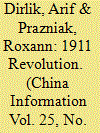

|
|
|
|
|
| Publication |
2011.
|
| Summary/Abstract |
The 1911 Revolution was a momentous event in bringing down the monarchical institution with a history of 2,000 years. Yet its consequences were ambiguous, it was overshadowed by the more radical revolution that followed in 1949, and it was stigmatized by the defeat of the Kuomintang, which claimed it as its own. Its 'revolutionariness' has been in question even as it has been celebrated as a turning point in modern Chinese history. This discussion reaffirms the revolutionary significance of the event, but also suggests that it is best viewed as a 'high peak' in a revolution of long duration that is yet to be completed. The current regime in China has revived aspects of monarchical culture and practices that revolutionaries sought to abolish in 1911. Most importantly, the promise of full citizenship for all that animated the 1911 Revolution remains unfulfilled, which may explain the contemporary regime's nervousness over the celebration of its 100th anniversary.
|
|
|
|
|
|
|
|
|
|
|
|
|
|
|
|
| 2 |
ID:
105492
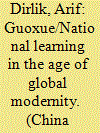

|
|
|
| 3 |
ID:
115722
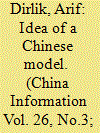

|
|
|
|
|
| Publication |
2012.
|
| Summary/Abstract |
This article questions the idea of a Chinese model. It argues that the so-called Chinese model is a variant of neoauthoritarian development associated with the developmental experience of other Eastern Asian states. What distinguishes China is the revolutionary experience - ignored by both Chinese and non-Chinese promoters of the Chinese model idea - that has left its mark on post-revolutionary development. Admiration for the authoritarian China model idea is voiced most audibly by those who place efficient development ahead of all other considerations, including democracy and social justice. These voices include apologists for the corporate neoliberal model that combines organizational authoritarianism with market 'freedom', as well as educational institutions that emulate corporate models, and serve as willing instruments of the Chinese regime's search for 'soft power'. Competing 'models' within China itself provide prima facie evidence of an unsettled search for sustainable development that reconciles the ideological goals of the regime with the realities of participation in a global capitalist economy. Indeed, if there is a 'China model', its most outstanding characteristic is the willingness to experiment with different models.
|
|
|
|
|
|
|
|
|
|
|
|
|
|
|
|
| 4 |
ID:
113766
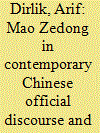

|
|
|
|
|
| Publication |
2012.
|
| Summary/Abstract |
Rather than repudiate Mao's legacy, the post-revolutionary regime in China has sought to recruit him in support of "reform and opening." Beginning with Deng Xiaoping after 1978, official historiography has drawn a distinction between Mao the Cultural Revolutionary and Mao the architect of "Chinese Marxism" - a Marxism that integrates theory with the circumstances of Chinese society. The essence of the latter is encapsulated in "Mao Zedong Thought," which is viewed as an expression not just of Mao the individual but of the collective leadership of the Party. In most recent representations, "Chinese Marxism" is viewed as having developed in two phases: New Democracy, which brought the Communist Party to power in 1949, and "socialism with Chinese characteristics," inaugurated under Deng Xiaoping and developed under his successors, and which represents a further development of Mao Zedong Thought. The Hu Jintao leadership has made an aggressive effort to portray "Chinese Marxism" as the most advanced development of Marxism that might also serve as a model for others. These interpretive operations have salvaged Mao for the national revolution and the legitimacy of the Communist Party. But it also presents a predicament in keeping alive memories of Mao's policies, which the Party is not always able to control in political memory, as has been illustrated most recently in the Chongqing experiment.
|
|
|
|
|
|
|
|
|
|
|
|
|
|
|
|
| 5 |
ID:
064213
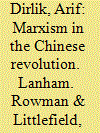

|
|
|
|
|
| Publication |
Lanham, Rowman & Littlefield, Publishers, 2005.
|
| Description |
x, 331p.
|
| Series |
state and sosciety in East Asia
|
| Standard Number |
0742530698
|
|
|
|
|
|
|
|
|
|
|
|
Copies: C:1/I:0,R:0,Q:0
Circulation
| Accession# | Call# | Current Location | Status | Policy | Location |
| 049812 | 335.4345/DIR 049812 | Main | On Shelf | General | |
|
|
|
|
| 6 |
ID:
030851
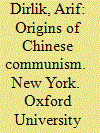

|
|
|
|
|
| Publication |
New York, Oxford University Press, 1989.
|
| Description |
xii, 315p.
|
| Standard Number |
0195054539
|
|
|
|
|
|
|
|
|
|
|
|
Copies: C:1/I:0,R:0,Q:0
Circulation
| Accession# | Call# | Current Location | Status | Policy | Location |
| 030105 | 335.4345/DIR 030105 | Main | On Shelf | General | |
|
|
|
|
|
|
|
|
|